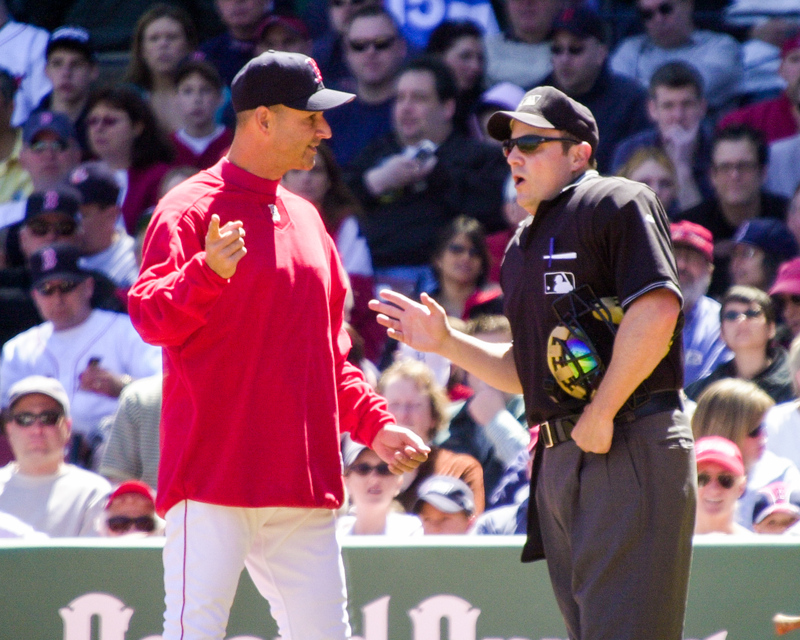Last updated on November 3rd, 2023 at 07:12 am
An umpire can’t eject another umpire during a game, no matter what. Even if an umpire misses a call during a game, you won’t see an umpire getting an ejection. Umps may receive a fine if they repeatedly miss a call during baseball games from the commissioner, however. The fines are set up to punish the ump and hopefully correct the error.
However, if an umpire does something egregious, like trying to fight someone on the field, they will be removed.
Can Umpires Leave a Baseball Game?
Umpires may leave a Major League or Minor League baseball game for two reasons, but an ejection is not one. One reason for an umpire to leave a game is if they sustain an injury. A foul ball off the ref can create severe damage, so some referees need to go to receive medical attention. The second reason why an umpire may leave a Major League or Minor League Baseball game pertains to illness. If the summer heat is getting to the ref, or the referee becomes sick during the game, they can leave.
What are Reasons to Eject Players During a Game?
Some reasons umpires eject players at ballparks include having unsportsmanlike conduct, complaining about a strike call as a hitter, or complaining about a balk call as a pitcher. Another reason for an ejection during a game include getting into a fight or brawl with the other team. Finally, players can receive an ejection if they are using an illegal substance or object during a baseball game.
What Happens if You Hit / Make Direct Contact with an Umpire?
Any player or manager who makes contact with an umpire receives an automatic ejection. Most contact with an umpire will receive a review by the MLB commissioner, and fines and suspensions may follow. There is a level of discretion that takes place like if you accidentally run into the umpire, but any intent results in an ejection.
How Many Umpires Call an MLB Game?

During a regular-season professional baseball game, you will find four umpires calling the game across the diamond. There is one first base, second base, third base, and home plate umpire to call each position. The home plate umpire is the lead official for every Major League Baseball game.
During the playoffs, you will see additional umps calling balls hit down the left and right field playing field lines. Unless there is an injury to the umpire in the game, you will at least see a home plate, first, second, and third base umpire for every game. The rule for postseason games is that the home plate umpire is still head ump.
Can MLB Umpires Be Fined?

Umpires are subject to fines for breaking any guidelines in the official rule book. Some penalties include allowing teams to improperly switch players during a game and missing calls during a replay. Angel Hernandez, an MLB umpire, had a fine issued to him after missing an apparent home run via a replay video. However, most umps won’t receive a penalty for missing a pitch or two that was in the strike zone, for example. Instead, umpires who mess up the rules while umpiring a game are subject to financial penalties.
Does an MLB Umpire Have the Authority to Eject a Fan from the Game?
According to the Baseball Rule Book 1.04, umpires can eject any fan who enters the playing field, or any team personal from a game. While refs can’t directly eject a fan from their seat, the crew chief ump can direct stadium security to remove a fan from their place. In 2016, umpire Bobo Davidson did eject a fan during the sixth inning from a game at Citizens Bank Park. He got stadium security to escort the fan out of the game due to his heckling. While this was surprising to everyone in attendance, the umpire technically did follow the appropriate protocol.
How Does the Umpire Signal an Ejection?
Ejecting a player or manager from a game only takes a handful of seconds. The motion for an ejection has the umpire point to that person and extends their arm away. The signal to eject a player or coach is relatively quick, and most managers come out to argue the ejection afterward. If a player or coach receives a removal, they have to spend the rest of the game in the clubhouse, and they can’t go back to the dugout.
What Do Payers Do When They Get Ejected?
When a baseball player or manager receives an ejection, they go back to the clubhouse in the ballpark. The player and manager are unable to return to the field, the dugout, or bullpen during the game. If the manager receives an ejection, the bench couch will take over as the manager for the remainder.
Can an Umpire Reverse an Ejection?
There is no reversal of a player’s ejection or coach in a baseball game by the umpire crew members. While the umpire may miss a call, which may lead to the removal of a player arguing with them, they won’t’ reverse an ejection. Most field umpires may admit a mistake during a postgame, but any additional unsportsmanlike conduct by a player or coach won’t receive a reversal in an ejection.
Conclusion
Baseball umpires, while able to remove players during the game, try and let the players play most of the time. Most batters may say something to the umpire if they disagree with a strike call, but most don’t result in an ejection. If you try and stand up the umpire at the plate to make them look bad, you can expect a removal.
Related Content You May Enjoy:
How Many Stiches are on a Baseball?
Why do Baseball Players Chew Gum?
Are Baseball Cards Worth Anything?
What is the Umpire in Baseball and Softball?
Greg Kristan, owner of The Stadium Reviews, LLC and TM Blast, LLC, brings his extensive experience visiting over half of the MLB ballparks, along with numerous MLS, NHL, NBA, and NFL venues, to provide in-depth coverage on the bag policy, food options, and parking. He has also been interviewed about his experiences on several sports podcasts.


